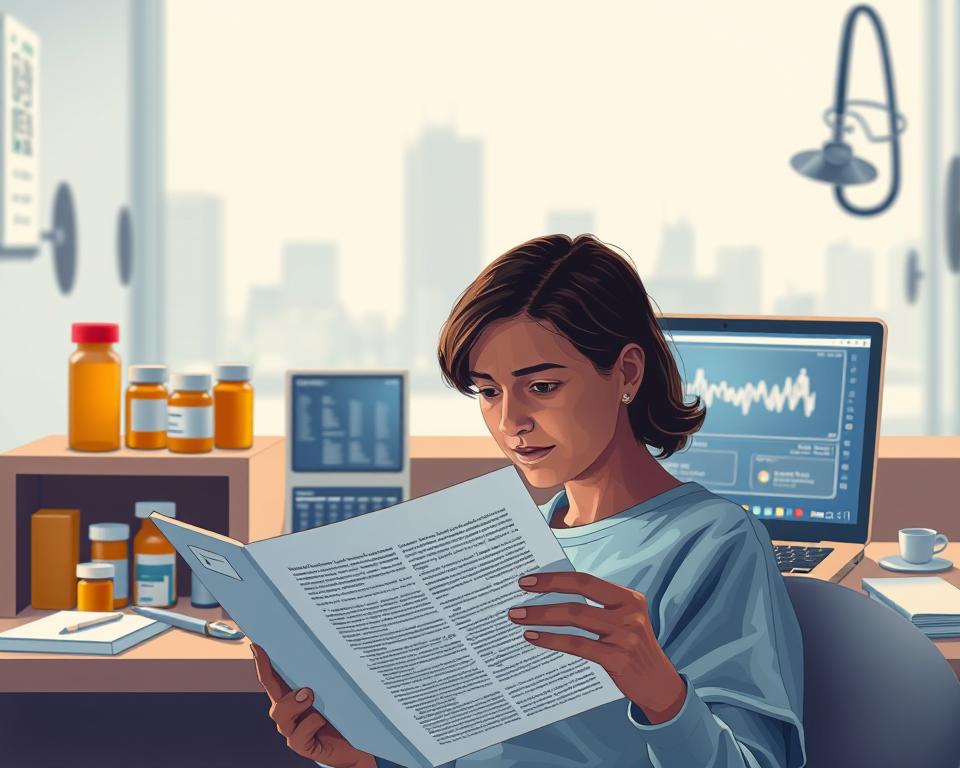
Why Health Literacy Matters for Your Well-Being
Did you know nearly 9 out of 10 adults in the U.S. struggle with basic health info? This shows how key health literacy is in today’s healthcare world. It’s not just about reading pamphlets or filling out forms. It’s about understanding health info to make smart health choices.
This skill is crucial for your well-being and health results. It helps you get around the healthcare system, understand medical advice, and talk well with doctors.
Exploring health literacy shows it’s important for everyone. A well-informed patient can better stand up for their health, get treatment options, and reach better health results.
Key Takeaways
- Health literacy impacts informed health decisions.
- Understanding basic health information is crucial for well-being.
- Effective communication with healthcare providers requires health literacy.
- A significant portion of adults struggle with health information.
- Health literacy is essential for navigating the healthcare system.
- Empowerment through knowledge leads to improved health outcomes.
Understanding Health Literacy
Health literacy is more than just reading and understanding written materials. It’s about being able to grasp health information in different ways. This includes visual, auditory, and digital formats.
Knowing about health literacy helps people make better choices for their health. Those who understand health information can better navigate the healthcare system. They can also make informed decisions about treatments and prevention.

Health literacy also plays a big role in public health. Communities with high health literacy levels see better health outcomes. People who understand their health can take steps to improve their lives.
Importance of Health Literacy
Health literacy is very important. It helps people understand and manage their health. Having good health literacy skills lets them read medical info, get healthcare, and take care of themselves.
When people know about health, they can make smart choices. This leads to better health results.
Defining Health Literacy Skills
Health literacy skills are about knowing how to use the healthcare system. They include reading labels, understanding medical terms, and checking health info sources. These skills help patients talk well with doctors and take charge of their health.
Impact on Patient Outcomes
Many studies show health literacy’s link to better patient results. People with good health literacy skills handle chronic diseases like diabetes better. They also go to the hospital less and use preventive care more.

The Role of Health Education
Health education is key in teaching people about health. It gives them the right info and skills to manage their health. This helps them make smart choices about their health.
Good health education helps prevent and manage diseases. It teaches people about treatments and the healthcare system. This knowledge leads to better health choices and a better life.
| Health Education Program | Focus Areas | Target Audience |
|---|---|---|
| Nutrition Workshops | Healthy eating, meal planning | Adults and families |
| Chronic Disease Management | Understanding diabetes, hypertension | Individuals with chronic conditions |
| Health Literacy Classes | Navigating healthcare, reading prescription labels | General public |
| Fitness Programs | Exercise routines, physical activity education | All age groups |
Adding health education to daily life makes managing health easier. With the right health knowledge, people can take control of their health. They can make informed decisions about their well-being.
Assessing Your Health Literacy Level
Knowing your health literacy level is key to making smart health choices. Many self-assessment tools can help you check your health knowledge. These tools are great for anyone wanting to boost their health literacy.
Self-Assessment Tools
Self-assessment tools can help you understand your health literacy better. They check how well you can handle health information. Here are two useful tools:
| Tool | Description | Target Audience |
|---|---|---|
| Health Literacy Questionnaire (HLQ) | This tool measures various dimensions of health literacy, focusing on how individuals manage health information. | Individuals of all ages seeking to improve their health literacy. |
| Test of Functional Health Literacy in Adults (TOFHLA) | TOFHLA evaluates reading comprehension and numeracy regarding health-related materials. | Adults requiring a detailed assessment of their functional health literacy. |
Both tools help you understand your health literacy better. They show your strengths and what you need to work on. Using these tools can help you understand health info better and talk better with doctors.
Healthcare Awareness and Its Influence
Healthcare awareness is key to improving health literacy in communities. When people know about healthcare services, they take a more active role in their health. This awareness helps them ask better questions, making informed decisions easier.
Knowing about health issues and policies helps people use the healthcare system better. With more awareness, individuals can make smarter choices about their health. This leads to better health outcomes when people are involved in their care.
To show how awareness affects health literacy, here’s a table:
| Aspect | Low Awareness | Moderate Awareness | High Awareness |
|---|---|---|---|
| Question-Asking Behavior | Rarely asks questions | Occasionally asks questions | Frequently asks detailed questions |
| Engagement with Healthcare Services | Minimal engagement | Some engagement | Active participation in healthcare decisions |
| Understanding of Public Health Policies | Poor understanding | Basic understanding | Comprehensive understanding |
| Impact on Health Outcomes | Poor management of health | Moderate management of health | Excellent management of health |
Health Literacy Programs Available
Health literacy programs help people make better health choices. They are found in community groups and online. This makes it easy for everyone to learn about health.
Community groups often hold workshops. They share important health info with different groups.
Community-Based Initiatives
Community programs offer real-life learning. They teach about health topics like nutrition and disease prevention. They also have support groups and resource centers.
- Workshops on essential health topics, such as nutrition, prevention of chronic diseases, and mental health.
- Support groups that encourage dialogue and sharing of personal health journeys.
- Resource centers that offer printed materials and access to health professionals.
Online Resources
Online resources have become very popular. They provide easy-to-understand health info. Some top sites include:
- MedlinePlus: A trusted source for health info, covering many topics for patients and families.
- Healthfinder: Offers tools and content to help people make healthy choices.
| Initiative Type | Description | Target Audience |
|---|---|---|
| Workshops | Interactive sessions focusing on various health topics | General public, specific communities |
| Support Groups | Encouraging peer support and dialogue | Individuals facing similar health challenges |
| Online Platforms | Accessible resources and tools for self-education | Broad audience seeking health information |
Promoting Health Literacy in Your Community
It’s key to boost health literacy in our communities for a healthier world. We can do this by working with schools, healthcare, and local groups. This way, we can create plans that really speak to different people.
Health fairs are a great way to share info and help people. At these events, folks can get health checks, talk to experts, and learn about important health topics. Workshops add to this by offering hands-on learning that helps people take care of their health.
Also, schools are crucial in teaching health literacy to kids. Teachers can add health lessons to the curriculum. This helps students learn about health early, setting them up for a lifetime of health awareness.
Community health projects succeed when everyone works together. By teaming up with local businesses and groups, we can use more resources. Public campaigns help spread the word, reaching everyone in the community. This pushes our goal of improving health literacy even further.
Strategies for Improving Personal Health Literacy
It’s important to get better at understanding health information. Talking clearly with doctors is a big part of this. It helps people make smart choices about their health.
Effective Communication with Healthcare Providers
Talking openly with doctors can really help. It makes sure you understand your health better. Here are some tips to help:
- Ask Questions: Don’t be shy to ask for clarification. Ask about medical terms, treatment options, and possible side effects.
- Request Written Instructions: Having something to look at can help you remember health info better.
- Summarize Your Understanding: Repeat back what you got from the doctor. This makes sure you got the message right.
- Advocate for Your Health: Speak up about what you want and worry about during your visit.
Using these tips can make you smarter about your health. It also helps you work better with your doctor for better health results.
| Strategy | Benefit |
|---|---|
| Asking Questions | Clarifies misunderstandings and enhances knowledge. |
| Requesting Written Instructions | Provides a reference point for better understanding. |
| Summarizing Your Understanding | Validates correct communication and reduces errors. |
| Advocating for Your Health | Empowers individuals to influence their healthcare decisions. |
Health Literacy Initiatives in the United States
Health literacy initiatives are key in changing the U.S. healthcare scene. Groups like the U.S. Department of Health and Human Services lead these efforts. They aim to raise awareness and improve health outcomes in communities.
The Centers for Disease Control and Prevention also play a big role. They create resources and campaigns to educate the public. These efforts help people understand the healthcare system better.
Key parts of these initiatives include:
- National campaigns promoting informed decision-making.
- Creating educational materials that everyone can understand.
- Working with local groups to reach more people.
Knowing about these health literacy efforts helps people take control of their health. They can use the resources available to improve their health knowledge and wellbeing. By getting involved, people can make better health choices.
| Initiative Name | Description | Key Focus Areas |
|---|---|---|
| Health Literacy Initiative | A program aimed at improving the overall health literacy of Americans. | Community education, Outreach programs, Resource development |
| CDC Health Education Campaign | Campaigns focused on preventing diseases through better health communication. | Public awareness, Health prevention strategies, Accessibility |
| National Health Information Network | A network providing comprehensive health information to citizens. | Information accessibility, Education resources, Technology integration |
Barriers to Achieving Health Literacy
Many people face big hurdles when it comes to health literacy. These obstacles make it hard for them to understand health information. It’s key to know these barriers to help everyone get the health care they need.
Identifying Common Challenges
There are many common challenges that block health literacy. These issues come from different places and affect people in different ways. It’s important to find and solve these problems.
- Language barriers: Not knowing English or other languages well can make health info hard to get.
- Limited education: Not having much education can make it tough to read medical texts and health materials.
- Lack of access to quality healthcare: Not having good health care can make health literacy problems worse. It stops people from getting the education they need.
- Cognitive impairments: Conditions like dementia or learning disabilities can make it hard to understand complex health info.
It’s crucial to tackle these health literacy barriers. By doing so, we can help people better understand their health. This way, we can make health care more accessible and supportive for everyone.
The Connection Between Health Literacy and Well-Being
Health literacy greatly affects our overall well-being. People with better health literacy tend to live healthier lives. They manage their health better and follow preventive measures.
Studies show a strong link between health literacy and following treatment plans. Those who understand health better can take better care of themselves. This leads to a better quality of life.
Improving health literacy encourages people to take charge of their health. This proactive approach can lower hospital visits and improve health in the long run. As communities focus on health literacy, everyone’s well-being improves, making communities healthier and happier.
Benefits of Enhanced Health Literacy Skills
Improving health literacy skills brings many benefits. It helps people understand health information better. This leads to smarter choices and actions in their health journey.
Empowering Decision-Making
People with better health literacy make more informed health decisions. They can grasp complex medical terms and understand treatment options. This knowledge lets them talk better with doctors and make choices that fit their health goals.
Improved Health Outcomes
There’s a clear link between health literacy and better health. Those who understand health information use prevention services more. This leads to healthier lives and benefits the community.
Studies show these individuals have fewer hospital stays and manage chronic conditions better. This shows how knowing health information can lead to better health results.
| Health Literacy Skill | Impact on Decision-Making | Outcomes |
|---|---|---|
| Understanding medical instructions | Increased confidence in adhering to prescriptions | Lower rates of medication errors |
| Accessing reliable health information | Better informed choices about treatments | Improved health management |
| Communicating with healthcare providers | Enhanced engagement in care planning | Lower hospitalization rates |
Conclusion
Understanding health information is key to managing our health. Health literacy helps us make smart choices about our health. By improving our health literacy, we can get better health results and help our community.
Improving health literacy is a team effort. It needs work from everyone, including individuals, doctors, and community groups. We must keep teaching and spreading the word about health literacy.
Health literacy does more than just help us individually. It also makes our community healthier. Let’s keep talking and finding ways to improve health literacy for everyone’s benefit.
FAQ
What is health literacy and why is it important?
Health literacy is the skill to get, understand, and use health info. It’s key for making smart health choices. It helps you navigate the healthcare world, follow doctor’s orders, and talk well with health pros. This affects your health and well-being.
How can I assess my health literacy level?
Use tools like the Health Literacy Questionnaire (HLQ) and the Test of Functional Health Literacy in Adults (TOFHLA). They show how well you understand health info. They also point out areas where you might need to learn more.
What are some effective health literacy programs available?
Many health literacy programs exist, like community workshops and online tools. Sites like MedlinePlus and Healthfinder offer easy-to-use info and tools. These help improve your health literacy.
How can I promote health literacy in my community?
To boost health literacy, work with schools, doctors, and community groups. Host health fairs, workshops, and education programs. This can really help your community’s health.
What are the benefits of improving health literacy skills?
Better health literacy means you can make smarter health choices. This leads to better health. People with good literacy skills are more likely to live healthier lives.
What barriers exist to achieving adequate health literacy?
Barriers include language issues, low education, and limited healthcare access. Also, cognitive problems can be a hurdle. We need to tackle these to help everyone understand health info better.
How does health education enhance health literacy?
Health education gives people the knowledge to manage their health. It helps them understand disease prevention and treatment. This leads to better health management.
What is the connection between health literacy and overall well-being?
Studies show health literacy and well-being are closely linked. People with good literacy skills tend to live healthier. They follow treatments better and manage chronic conditions well.







